Dylan's Fifth Contribution and Possible Ending for the Tale
by Dylan
(Illinois, Wisconsin )
And indeed, thirst came to torment Raker more and more as the day wore on. He rationed out his water, taking smaller and smaller sips, growing more anxious with every drop he consumed. That night, he camped out between the dry, stony banks. He was nervous sleeping in the open without a weapon, and settled in the end on unfolding his collapsible shovel and laying it by his side. He insisted to himself he had no reason to fear the Ptus, that in the morning he would wake and find that his terror of them had passed, just as it had with the zuff.
As he expected, he found that he no longer believed in them when the small sun rose. What’s more, after he had abandoned his smoldering fire and set off down the dry river, he discovered he had another new memory, this one more useful than the previous delusive warnings. He now knew that a certain small creature, the ura, withdrew water from the regolith and stored it, purified, in the bladders of its member nodes. He also knew where to hunt for the critter, for his delayed memory told him they often nested in the metallic-blue “shrubs” he had suspected of being poisonous upon landing.
He immediately set out hunting for just such a patch and found one not much farther down the dusty riverbed. He crept slowly toward it, hefting a fist-sized stone in his right hand. After a few moments he was searching down through its reflective, razor-edged leaves, and then abandoning it for another such patch nearby where he hoped he would have more luck.
And so went the entire day. Shrub after shrub yielded nothing except a cut on his right hand from the razor sharp fronds, which swelled up and stung painfully; and Raker spat a series of curses more profane than he ever had uttered in his life.
Then- luck! As the sun was getting low, he spotted the rustling of metallic leaves at the ancient river’s edge. Clumsily gripping a rock in his left hand, Raker kept his eyes locked on the plant in question, barely daring to breath. He thought he could make out the shadowy form of an ura with its proboscis lodged in the icy ground. With intense concentration, he took aim at the creature and hurled the stone. He was rewarded with a cacophony of shrill hoots. He was distinctly relieved and pleased with himself as he used the shovel to brush the serrated leaves aside so he could retrieve his prey. Then he froze.
He could see nothing but the dusty white soil of Pallas.
He probed frantically with the shovel, searching for the corpse he was sure was there. He got down on all fours, ignoring the shooting pain in his hand, and looked under the covering leaves of the shrub. Standing, he wacked furiously at it, until this proved a bad idea as it sent shiney blue knives flying through the air in all directions.
Eventually he collapsed in a fury, tears of frustration welling in his eyes. He was sure there had been an ura in that bush, siphoning the water that he needed so desperately! He had seen it, killed it, heard it die! Where had it gone?!
His mind went back to the drawings on the riverside stone. Those had also disappeared before his eyes, almost like he hadn’t been meant to see them. Depicted in them had been humans, like himself, surviving against the Palladian dangers. But he could not believe it had been made by another candidate patrolman. He, at least, had been busy surviving since his arrival on this cursedly dry planetoid. What candidate in their right mind would stop to scratch out a picture? Furthermore, the images had depicted Palladian life of an animal or sapient nature, where the only examples he had encountered had been stationary.
A story began to form in his head. The Patrol sent its candidates to Pallas and filled their heads with pertinent warnings and tips about the environment they were to survive in, to be locked up in their brains until they needed it. The candidates encountered the dangers of Pallas and bested them, fending off zuffs, drinking from uras, defeating the Ptus, and taking whatever they needed wherever they could find it. But the Ptus had the ability to meddle in minds, like Callistans, and they despised humanity for killing them and reaping the fruits of their home. So, slowly and methodically, by mentally hiding themselves and vital resources, they developed a way to kill off intruders without ever having to confront them.
Shadows gathered and the air turned freezing, and yet Raker felt compelled to go, to get the hell away, off this little world and back to Earth. Finally standing, he used his shovel to hack down some thicker fronds of grass and, binding them up with vines, made a crude torch. Then he gathered his pack and set off through the crags and valleys, gripping his shovel in one hand and the torch in the other.
He hurried in fright through the darkness. The meteors carried on their magnificent display unheeded, for in every deep shadow Raker imagined hostile Palladian eyes glaring out at him, waiting for him to collapse. He had ceased paying mind to his drinking, and so had unthinkingly finished off the last of his water. The first harbingers of thirst were tickling in his throat, and the itch drove him harder into the night, toward the impossibly distant blinking dot on his positioner.
Raker carried on for days, barely stopping to eat and unable to drink. Palladian days and nights carried on in a blur, he got frostbite in his hands and feet, swollen cuts from the shrubs on his legs, and he had twisted his ankle stumbling over a jutting rock. But he pushed onward in a thirsty haze, thinking only of that blinking point and rescue.
When he finally reached it, he was limping along slowly, dragging his sprained foot, his mind lost in delirium. If he had be cognizant, he would have realized he could not have gotten to the pickup point yet, that the image on his positioner must be another lie.
There was no space-pod waiting for him there. There were instead three mounds, about the length of a man, in parallel lines on the ground. To the side of them was a trench, about four feet deep, and the same length as the mounds.
Raker fell then, and lay still. All about him, the world was silent, and not even the whistling, wheezing night life of Pallas intruded on the quiet.
Out of the darkness, insectoid creatures slid gracefully. They regarded the intruder silently, an air of cold finality about them. Then, cooly, they deposited him in the trench and covered him in white Palladian soil.
On Earth, the Chief Patrolman read a report saying the fourth candidate patrolman in a row and failed to make pickup on Pallas without any clear reason. A search and rescue party had turned up nothing, just as it had with the other candidates. The International Interplanetary Authority would not permit them to send candidates there anymore unless the source of the disappearances could be discerned and dealt with.
The Chief grunted. That meant never. It was a mystery, alright, but the Patrol didn’t have the resources to investigate a mystery on an out-of-the-way planetoid like Pallas.
“Well,” she said, “poor kids.”
And so silent Pallas spun alone in the starry sky.


































